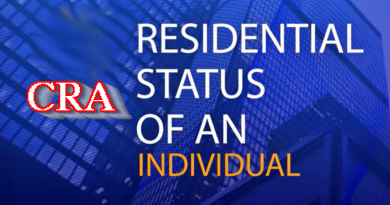S5-F1-C1: Determining an Individual’s Residence Status
1.36 An individual who is not factually resident in Canada, but who is referred to in (a) to (f) of ¶1.34, is deemed to be resident in Canada regardless of where that individual lives or performs services. An individual who ceases to be described in (a) to (e) of ¶1.34 at a particular date in the year will be deemed to be resident in Canada only to that date, pursuant to subsection 250(2). Thereafter, residence will depend on the factors outlined in ¶1.10 – 1.21.
Deemed non-residents – subsection 250(5)
Application of subsection 250(5)
1.37 Pursuant to subsection 250(5), an individual will be deemed to be a non-resident of Canada at a particular time if, at that time, although otherwise resident in Canada (either factual or deemed), the individual is considered to be resident in another country under an income tax treaty between Canada and that other country. In other words,subsection 250(5) will apply if the tie-breaker rules in a tax treaty between Canada and another country result in a determination that the individual is resident in the other country.
1.38 Where subsection 250(5) applies, an individual will be deemed to be a non-resident of Canada for all purposes of the Act (that is, the individual will cease to be a resident of Canada from that time). The rules applicable to individuals ceasing to be resident in Canada, including the provisions deeming an individual to dispose of certain property and thePart XIII withholding tax provisions, will apply from that date (see ¶1.39 for further information). Prior to a legislative amendment effective as of February 24, 1998, subsection 250(5) applied only to corporations. Accordingly,subsection 250(5) does not apply to an individual who was resident in another country for treaty purposes, but otherwise resident in Canada, on February 24, 1998, as long as the individual has maintained this dual residence status continuously since that time.
More information
1.39 For general tax information relevant to non-residents and deemed non-residents of Canada, see Guide T4058,Non-Residents and Income Tax. For information concerning the tax implications for individuals ceasing to be resident in Canada, refer to Leaving Canada (emigrants).
The tie-breaker rules in tax treaties
1.40 An individual who is a resident of Canada for purposes of the Act is also considered a resident of Canada for purposes of paragraph 1 of the Residence article of an income tax treaty between Canada and another country. In some treaties, it is referred to as the Resident, Fiscal Domicile or Fiscal Residence article. Such an individual may also be a resident of the other country for purposes of the same paragraph in the same treaty (a dual resident). Whether an individual is considered resident in a country for purposes of paragraph 1 of the Residence article of a particular tax treaty between Canada and another country generally depends on whether the individual is liable to tax in that country within the meaning of the particular treaty.
Meaning of liable to tax
1.41 It has been the long-standing position of the CRA that, to be considered liable to tax for the purposes of the Residence article of Canada’s tax treaties, an individual must be subject to the most comprehensive form of taxation as exists in the relevant country. For Canada, this generally means full tax liability on worldwide income. This is supported by the comments of the Supreme Court of Canada in The Queen v Crown Forest Industries Limited, [1995] 2 SCR 802,95 DTC 5389, wherein the court stated:
“the criteria for determining residence in Article IV, paragraph 1 involve more than simply being liable to taxation on some portion of income (source liability); they entail being subject to as comprehensive a tax liability as is imposed by a state. In the United States and Canada, such comprehensive taxation is taxation on world-wide income.”
1.42 An individual does not necessarily have to pay tax to another country in order to be considered liable to tax in that country under paragraph 1 of the Residence article of the tax treaty with Canada. There may be situations where an individual’s worldwide income is subject to another country’s full taxing jurisdiction, however, the country’s domestic laws do not levy tax on an individual’s taxable income or taxes it at low rates. In these cases, the CRA will generally accept that an individual is a resident of the other country unless the arrangement is abusive (for example, treaty shopping where the individual is in fact only a resident of convenience). Such could be the case, for example, where an individual is placed within the taxing jurisdiction of a particular country in order to gain treaty benefits in a manner that does not create any material economic nexus to that country.
1.43 For purposes of paragraph 1 of the Residence article of a particular tax treaty, the onus rests on an individual to demonstrate that he or she is liable to tax in the other country. The CRA is entitled to rely on the assumption that an individual is not resident in the other country for purposes of the treaty unless the individual can establish otherwise. This position is based on the Supreme Court of Canada’s decision in Johnston v MNR , [1948] SCR 486, 3 DTC 1182. It is also supported by McFadyen v The Queen, [2000] TCJ No. 589, 2000 DTC 2473, which was heard at the Tax Court of Canada and later affirmed by the Federal Court of Appeal ( 2002 FCA 496, 2003 DTC 5015 ).





